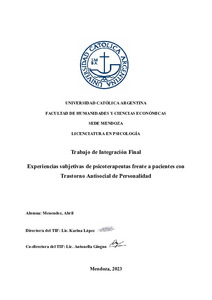Por favor, use este identificador para citar o enlazar este ítem:
https://repositorio.uca.edu.ar/handle/123456789/17831| Título : | Experiencias subjetivas de psicoterapeutas frente a pacientes con Trastorno Antisocial de Personalidad | Autor : | Menéndez, Abril | Director de Tesis: | López, Karina Giugno, Antonella |
Palabras clave : | PSICOLOGIA; PSICOTERAPIA; TRASTORNO ANTISOCIAL DE PERSONALIDAD; EXPERIENCIAS SUBJETIVAS; FORMACION CLÍNICA | Fecha de publicación : | 2023 | Cita : | Menéndez, A. Experiencias subjetivas de psicoterapeutas frente a pacientes con Trastorno Antisocial de Personalidad [en línea]. Tesis de Licenciatura en Ciencias de la Educación. Pontificia Universidad Católica Argentina, 2023. Disponible en: https://repositorio.uca.edu.ar/handle/123456789/17831 | Resumen : | Resumen: El presente trabajo tiene como finalidad explorar acerca de las experiencias subjetivas de
psicoterapeutas frente a personas con trastorno de personalidad antisocial. Qué tipo de
reacciones emocionales o físicas se les han presentado, qué conocimientos pueden aportar de
dicho trastorno, las diferentes herramientas y estrategias utilizadas, y, por último, si creen
necesaria una formación clínica para su correspondiente abordaje. Para evaluar dichos
objetivos, se llevó a cabo una investigación de metodología cualitativa. Haciendo uso de un
diseño fenomenológico, ya que, dicho objetivo, responde a conocer las experiencias
subjetivas vivenciadas por los profesionales entrevistados. Se realizaron entrevistas
semiestructuradas, que luego fueron analizadas mediante codificación temática, para
establecer codificaciones que posibilitaron el análisis y la interpretación de los datos. Los
resultados arrojados demuestran que las experiencias vivenciadas por los diferentes
profesionales han sido muy similares, muy difíciles de sobrellevar, y de querer abordar.
También, que las formaciones clínicas que se pueden realizar, pese al sentimiento de no creer
que puedan llegar a una posible “cura” o a un reconocimiento “empático”, son necesarias
para poder al menos, a través de ciertas herramientas, lograr en los sujetos ciertos
razonamientos morales, que los lleven a poder convivir en sociedad, y hacer la terapia un
poco más amena. Abstract: The purpose of this paper is to explore the subjective experiences of psychotherapists in relation to people with antisocial personality disorder. What kind of emotional or physical reactions have been presented to them, what knowledge they can provide about this disorder, the different tools and strategies used, and, finally, if they believe clinical training is necessary for their corresponding approach. To evaluate these objectives, a qualitative methodology research was carried out. Making use of a phenomenological design, since this objective responds to knowing the subjective experiences lived by the interviewed professionals. Semi-structured interviews were conducted, which were then analyzed by means of thematic coding, to establish codifications that enabled the analysis and interpretation of the data. The results show that the experiences lived by the different professionals have been very similar, very difficult to bear, and to want to address. Also that, the clinical trainings that can be carried out, despite the feeling of not believing that they can reach a possible "cure" or an "empathetic" recognition, are necessary to be able at least, through certain tools, to achieve in the subjects certain moral reasoning, which lead them to be able to live together in society, and make therapy a little more pleasant. |
URI : | https://repositorio.uca.edu.ar/handle/123456789/17831 | Disciplina: | EDUCACION | Derechos: | Acceso abierto |
| Aparece en las colecciones: | Licenciatura en Ciencias de la Educación |
Ficheros en este ítem:
| Fichero | Descripción | Tamaño | Formato | |
|---|---|---|---|---|
| trastorno-antisocial-personalidad.pdf | 534,09 kB | Adobe PDF |  Visualizar/Abrir |
Visualizaciones de página(s)
50
comprobado en 27-abr-2024
Descarga(s)
42
comprobado en 27-abr-2024
Google ScholarTM
Consultar
Este ítem está sujeto a una licencia Creative Commons Licencia Creative Commons

